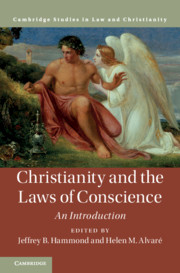Book contents
- Christianity and the Laws of Conscience
- Law and Christianity
- Christianity and the Laws of Conscience
- Copyright page
- Dedication
- Contents
- Contributors
- Acknowledgments
- Introduction
- Part I Themes in Understandings of Conscience in Christianity
- 1 Conscience in the New Testament
- 2 Conscience and Natural Law in Scripture
- 3 Conscience in Early Christian Thought
- 4 Sensus Fidei, the Magisterium, and the Formation of Conscience
- Part II Conscience According to Major Figures and Traditions
- Part III Applied Topics in Law and Conscience
- Index
- References
2 - Conscience and Natural Law in Scripture
from Part I - Themes in Understandings of Conscience in Christianity
Published online by Cambridge University Press: 12 June 2021
- Christianity and the Laws of Conscience
- Law and Christianity
- Christianity and the Laws of Conscience
- Copyright page
- Dedication
- Contents
- Contributors
- Acknowledgments
- Introduction
- Part I Themes in Understandings of Conscience in Christianity
- 1 Conscience in the New Testament
- 2 Conscience and Natural Law in Scripture
- 3 Conscience in Early Christian Thought
- 4 Sensus Fidei, the Magisterium, and the Formation of Conscience
- Part II Conscience According to Major Figures and Traditions
- Part III Applied Topics in Law and Conscience
- Index
- References
Summary
David VanDrunen ties the natural law concepts found in both the Old and New Testaments to a sense of conscience. The notion of natural law appears early in the Old Testament, in God’s covenant with Noah. God instructs Noah that, for example, the killing of an innocent must be recompensed (thereby indicating that innocent people must not be wantonly killed). While there is not one Hebrew word for conscience in the OT, it does identify the “heart” (leb) and “kidneys” (kelayot) as the mechanisms by which the wise and discerning person applies what he knows to be true about the way the world works. In the New Testament, conscience is the “subjective human faculty that recognizes right and wrong and thus bears witness to a person’s standing before the law.” The Apostle Paul’s discussion of natural law in Romans chapters 2 and 3 reveals that although not all receive God’s express law (as did God’s people on Mt. Sinai), all people everywhere have an innate sense of moral rectitude to which their consciences testify. All persons everywhere therefore are subject to God’s righteous judgment.
Keywords
- Type
- Chapter
- Information
- Christianity and the Laws of ConscienceAn Introduction, pp. 39 - 56Publisher: Cambridge University PressPrint publication year: 2021
References
Recommended Reading
- 1
- Cited by

